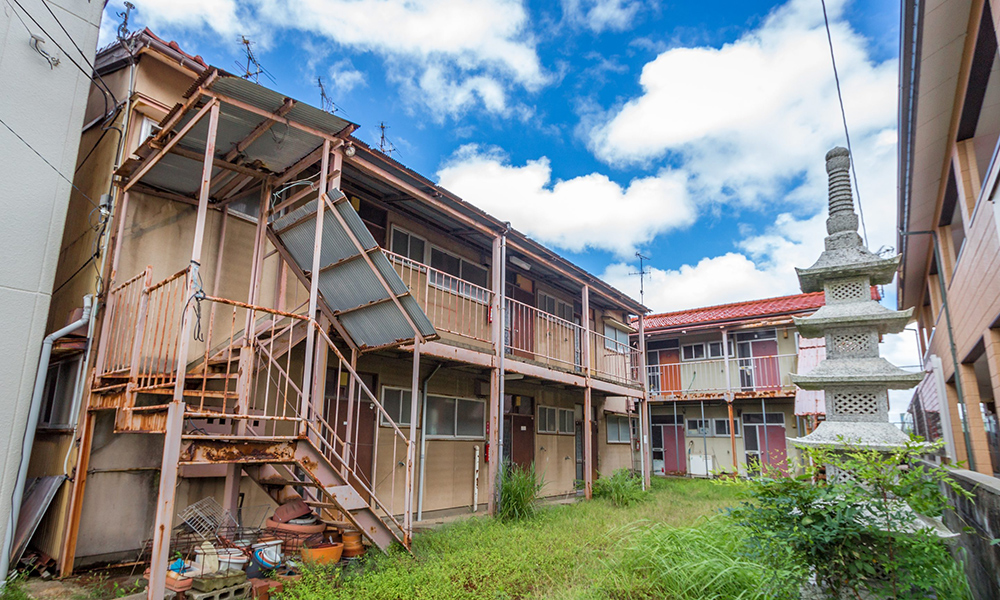
近年來(lái),,美國(guó)房地產(chǎn)市場(chǎng)一直受到供應(yīng)不足的影響,,而日本的情況卻恰恰相反,人口減少導(dǎo)致空置房屋數(shù)量飆升,。
根據(jù)日本總務(wù)?。∕inistry of Internal Affairs and Communications)在今年4月30日公布的數(shù)據(jù),該國(guó)的空置房屋已經(jīng)達(dá)到899萬(wàn)套,。這一數(shù)字比2018年的上一次調(diào)查增加了50萬(wàn),,比20年前激增了80%。
這也意味著日本目前有創(chuàng)紀(jì)錄的13.8%的房屋空置,,在一些人口下降較快的農(nóng)村地區(qū),,這一比例超過(guò)了20%。
這一數(shù)字包括第二套住房和因?yàn)榫用裨谄渌胤脚R時(shí)工作等原因而空置的住房,。但廢棄房屋的數(shù)量也在躍升,,比2018年的調(diào)查增加了36萬(wàn)套,達(dá)到目前的385萬(wàn)套,,占所有房屋的5.9%,。
無(wú)獨(dú)有偶,美國(guó)人口調(diào)查局(U.S. Census Bureau)也在4月30日發(fā)布了類(lèi)似的數(shù)據(jù),,報(bào)告稱(chēng)第一季度租賃住房的空置率為6.6%,,自有住房的空置率為0.8%。這些數(shù)據(jù)與一年前相比變化甚微,。
日本的空置率與野村綜合研究所(Nomura Research Institute)早些時(shí)候的一份報(bào)告一致,,該研究所曾經(jīng)在2017年預(yù)測(cè),如果不采取任何措施,,到2033年日本房屋空置率可能就會(huì)超過(guò)30.4%,。
該機(jī)構(gòu)警告稱(chēng):“三分之一的房屋空置意味著,平均每戶(hù)人家隔壁都有一棟房屋空置,?!?/p>
想象一下,一排三棟房子,,中間一棟空置,,這意味著另外兩棟有人居住的房屋挨著一棟空置房屋。
野村綜合研究所補(bǔ)充道:“無(wú)人居住的房屋會(huì)成為垃圾堆放點(diǎn),,容易倒塌,,并吸引可疑人員。從安全和防災(zāi)的角度來(lái)看,,30%的房屋空置肯定是不可取的,。”
野村綜合研究所指出,,最佳解決辦法是增加日本人口,,或者至少阻止人口減少,,但該研究所也承認(rèn)這很困難,需要很長(zhǎng)時(shí)間才能夠?qū)崿F(xiàn)目標(biāo),。日本人口多年來(lái)一直在下降,,2022年的最新統(tǒng)計(jì)顯示,,日本人口比上一年減少了80多萬(wàn),,降至1.254億。與此同時(shí),,出生率創(chuàng)歷史新低,,兒童數(shù)量已經(jīng)連續(xù)43年下降。
其他方案包括拆除空置房屋,、限制新建房屋,,以及將其改建為非住宅物業(yè)。日本政府曾經(jīng)試圖通過(guò)允許地方政府在房屋沒(méi)有得到改善的情況下拆除面臨倒塌風(fēng)險(xiǎn)的房屋,,或者向管理不善的業(yè)主發(fā)出警告來(lái)解決這一問(wèn)題,。但據(jù)《日本經(jīng)濟(jì)新聞》(Nikkei)報(bào)道,這些努力收效甚微,。
專(zhuān)家告訴美國(guó)有線(xiàn)電視新聞網(wǎng)(CNN),,稅收政策也讓一些房屋空置比拆除更為劃算,而其他房產(chǎn)則因?yàn)橛涗浕靵y導(dǎo)致所有權(quán)不明而陷入繁瑣程序,。
許多外國(guó)人認(rèn)為日本的房地產(chǎn)市場(chǎng)上有特價(jià)房,,但高昂的翻新成本和語(yǔ)言障礙可能會(huì)阻礙許多房屋以這種方式出售。
位于日本千葉的神田外語(yǔ)大學(xué)(Kanda University of International Studies)的講師杰弗里·霍爾對(duì)美國(guó)有線(xiàn)電視新聞網(wǎng)表示:“事實(shí)上,,這些房屋大多不會(huì)出售給外國(guó)人,,或者說(shuō),對(duì)于那些不會(huì)說(shuō)日語(yǔ),、也無(wú)法讀懂日語(yǔ)的人而言,,完成大量的行政工作和理解背后的規(guī)則并不容易。他們不可能以低價(jià)買(mǎi)入這些房屋,?!保ㄘ?cái)富中文網(wǎng))
譯者:中慧言-王芳
近年來(lái),美國(guó)房地產(chǎn)市場(chǎng)一直受到供應(yīng)不足的影響,,而日本的情況卻恰恰相反,,人口減少導(dǎo)致空置房屋數(shù)量飆升。
根據(jù)日本總務(wù)?。∕inistry of Internal Affairs and Communications)在今年4月30日公布的數(shù)據(jù),,該國(guó)的空置房屋已經(jīng)達(dá)到899萬(wàn)套。這一數(shù)字比2018年的上一次調(diào)查增加了50萬(wàn),,比20年前激增了80%,。
這也意味著日本目前有創(chuàng)紀(jì)錄的13.8%的房屋空置,,在一些人口下降較快的農(nóng)村地區(qū),這一比例超過(guò)了20%,。
這一數(shù)字包括第二套住房和因?yàn)榫用裨谄渌胤脚R時(shí)工作等原因而空置的住房,。但廢棄房屋的數(shù)量也在躍升,比2018年的調(diào)查增加了36萬(wàn)套,,達(dá)到目前的385萬(wàn)套,,占所有房屋的5.9%。
無(wú)獨(dú)有偶,,美國(guó)人口調(diào)查局(U.S. Census Bureau)也在4月30日發(fā)布了類(lèi)似的數(shù)據(jù),,報(bào)告稱(chēng)第一季度租賃住房的空置率為6.6%,自有住房的空置率為0.8%,。這些數(shù)據(jù)與一年前相比變化甚微,。
日本的空置率與野村綜合研究所(Nomura Research Institute)早些時(shí)候的一份報(bào)告一致,該研究所曾經(jīng)在2017年預(yù)測(cè),,如果不采取任何措施,,到2033年日本房屋空置率可能就會(huì)超過(guò)30.4%。
該機(jī)構(gòu)警告稱(chēng):“三分之一的房屋空置意味著,,平均每戶(hù)人家隔壁都有一棟房屋空置,。”
想象一下,,一排三棟房子,,中間一棟空置,這意味著另外兩棟有人居住的房屋挨著一棟空置房屋,。
野村綜合研究所補(bǔ)充道:“無(wú)人居住的房屋會(huì)成為垃圾堆放點(diǎn),,容易倒塌,并吸引可疑人員,。從安全和防災(zāi)的角度來(lái)看,,30%的房屋空置肯定是不可取的?!?/p>
野村綜合研究所指出,,最佳解決辦法是增加日本人口,或者至少阻止人口減少,,但該研究所也承認(rèn)這很困難,,需要很長(zhǎng)時(shí)間才能夠?qū)崿F(xiàn)目標(biāo)。日本人口多年來(lái)一直在下降,,2022年的最新統(tǒng)計(jì)顯示,,日本人口比上一年減少了80多萬(wàn),降至1.254億,。與此同時(shí),,出生率創(chuàng)歷史新低,,兒童數(shù)量已經(jīng)連續(xù)43年下降。
其他方案包括拆除空置房屋,、限制新建房屋,,以及將其改建為非住宅物業(yè)。日本政府曾經(jīng)試圖通過(guò)允許地方政府在房屋沒(méi)有得到改善的情況下拆除面臨倒塌風(fēng)險(xiǎn)的房屋,,或者向管理不善的業(yè)主發(fā)出警告來(lái)解決這一問(wèn)題,。但據(jù)《日本經(jīng)濟(jì)新聞》(Nikkei)報(bào)道,這些努力收效甚微,。
專(zhuān)家告訴美國(guó)有線(xiàn)電視新聞網(wǎng)(CNN),,稅收政策也讓一些房屋空置比拆除更為劃算,,而其他房產(chǎn)則因?yàn)橛涗浕靵y導(dǎo)致所有權(quán)不明而陷入繁瑣程序,。
許多外國(guó)人認(rèn)為日本的房地產(chǎn)市場(chǎng)上有特價(jià)房,但高昂的翻新成本和語(yǔ)言障礙可能會(huì)阻礙許多房屋以這種方式出售,。
位于日本千葉的神田外語(yǔ)大學(xué)(Kanda University of International Studies)的講師杰弗里·霍爾對(duì)美國(guó)有線(xiàn)電視新聞網(wǎng)表示:“事實(shí)上,,這些房屋大多不會(huì)出售給外國(guó)人,或者說(shuō),,對(duì)于那些不會(huì)說(shuō)日語(yǔ),、也無(wú)法讀懂日語(yǔ)的人而言,完成大量的行政工作和理解背后的規(guī)則并不容易,。他們不可能以低價(jià)買(mǎi)入這些房屋,。”(財(cái)富中文網(wǎng))
譯者:中慧言-王芳
While the U.S. housing market has suffered from a lack of supply in recent years, the opposite is the case in Japan, where a shrinking population has sent the number of empty homes soaring.
Vacancies in that country have hit 8.99 million, according to data released by the Ministry of Internal Affairs and Communications on April 30. That’s an increase of 500,0000 from the prior survey in 2018 and an 80% surge from 20 years ago.
It also means a record 13.8% of homes in Japan are now vacant, with the share topping 20% in some rural areas where populations are falling faster.
That number includes second homes and others that are vacant for reasons that include the resident working temporarily elsewhere. But the number of abandoned homes also jumped, rising by 360,000 from the 2018 survey to 3.85 million today, or 5.9% of all homes.
Coincidentally, the U.S. Census Bureau also released similar data on April 30, and it reported that vacancy rates in the first quarter were 6.6% for rental housing and 0.8% for homeowner housing. Those were little changed from a year ago.
The vacancy rates from Japan are in line with an earlier report from the Nomura Research Institute, which predicted in 2017 that the vacancy rate could exceed 30.4% by 2033 if nothing is done about it.
“Having a third of houses vacant means that on average, each home would have a vacant house next door,” it warned.
So imagine three houses in a row with a vacant one in the middle, meaning the other two that are occupied are next to an empty house.
“Unoccupied houses become sites for trash dumping, are susceptible to collapse, and attract suspicious persons,” Nomura added. “Having 30% of houses vacant is certainly not desirable from the perspective of safety and disaster prevention.”
The best solution would be to increase Japan’s population or at least halt its decline, it said, while acknowledging that would be difficult and take a long time. The population has been in decline for years, and the most recent count in 2022 showed it shrank by more than 800,000 from the prior year to 125.4 million. Meanwhile, the birth rate has hit record lows, and the number of children has fallen for 43 consecutive years.
Other options include removing vacant homes, limiting the construction of new ones, and converting them to non-residential properties. The government has tried to tackle the problem by allowing local authorities to demolish homes at risk of collapse if improvements aren’t made or issue warnings to owners of mismanaged properties. But those efforts have seen limited success, according to?Nikkei.
Tax policies also make it cheaper to keep some homes empty than to demolish them, and other properties are stuck in red tape when record-keeping snafus obscure ownership, experts told CNN.
Many foreigners see bargains to be had in Japan’s housing market, but the high costs of renovation and language barriers will likely prevent many from being sold that way.
“The truth is most of these homes are not going to be sold to foreigners, or that the amount of administrative work and the rules behind it [are] not something easy for somebody who doesn’t speak Japanese and read Japanese very well,” Jeffrey Hall, a lecturer at Kanda University of International Studies in Chiba, told CNN. “They’re not going to be able to get these houses for cheap.”






